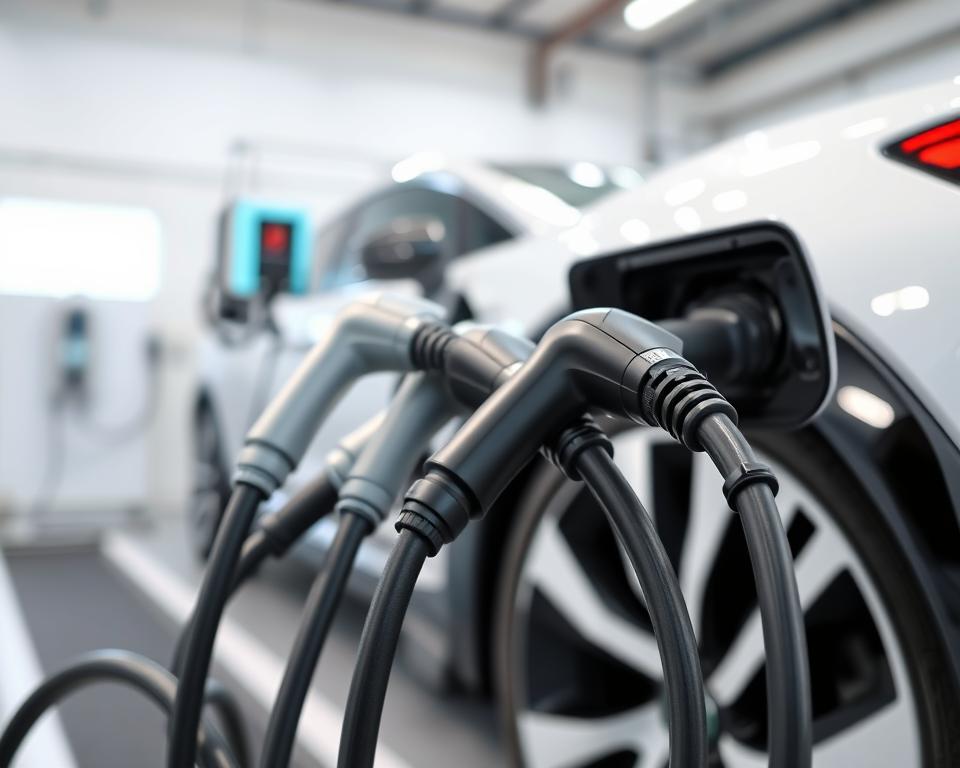Leading EV Charging Cable Manufacturers for Your EV
The EV market is expanding rapidly, with the demand for reliable and high-performance charging solutions increasing sharply. Today, industry leaders have been at the vanguard of this change, providing top-tier charging infrastructure. Southwire, for instance, has been a significant player since 2014, garnering 1000+ five-star reviews and 75 years of experience in the electrical construction industry.
The upswing in electric vehicle adoption necessitates the need for durable, rapid, and safe Charger Manufacturers in China. Leading brands are developing to address changing requirements, offering solutions that improve the overall charging experience.
Grasping the distinctions between various charging solutions is crucial for choosing correctly. Quality charging infrastructure directly influences vehicle performance and user experience.
Major Highlights
- Leading brands provide premium cables that boost durability and security.
- The demand for efficient charging infrastructure is on the rise with the growth of the electric vehicle market.
- Top brands pioneer solutions for changing EV requirements.
- Quality charging cables directly impact charging efficiency and vehicle performance.
- Investing in quality charging infrastructure is beneficial in the long run.

The Critical Role of Premium EV Charging Cables
As more drivers choose EVs, the value of top-grade EV charging cables is immense. The efficiency, safety, and reliability of electric vehicle charging systems depend heavily on the quality of the charging cables used.
Advancements in EV Charging
Electric vehicle charging technology has undergone significant advancements in recent years, with a focus on speedy charge times and enhanced protections. Modern EV charging cables are built for these requirements, incorporating superior materials and construction techniques to minimize energy waste and maximize transfer rates.
Quality’s Impact on EV Charging
High-grade cables ensure reliable, safe charging. Durable features, such as all-weather performance and temperature tolerance, ensure reliable operation across various environments. Moreover, regulatory compliance and adherence to industry guidelines are essential in guaranteeing safe operation.
| Key Features | Benefits |
|---|---|
| High-grade build quality | Reduced energy waste |
| Robust durability | Weather resistance, flexibility in extreme temperatures |
| Standards adherence | Rigorous safety requirements met |
| Serviceability | Repairable design for longevity |
Products from Aichie Tech Electronics pass The Cable Lab’s stringent tests. With repairable Portable EV Charger Manufacturer, users can save hundreds over a decade by choosing repairs over replacements, reducing waste and protecting the planet.
Premier Chinese EV Cable Suppliers
A surge of cable makers in China supports the EV boom. These companies are crucial in supporting the expanding electric vehicle (EV) market, providing high-quality automotive cables designed for various charging needs.
Wottz – Pioneers in EV Cables Since 2014
Wottz has established itself as a prominent player in the EV charging cable market since 2014. They offer a range of cables that meet the specific requirements of EV charging systems, including Mode 1, 2, 3, and DC Fast Charging (Mode 4).
Aichie Tech Electronics: 75+ Years of Electrical Expertise
Aichie Tech Electronics leverages 75 years of electrical expertise in its EV cables. Their products are built for residential and commercial applications.
Additional Key Cable Suppliers
Beyond industry leaders like Wottz and Southwire, other manufacturers are making their mark by focusing on specific automotive applications or technological innovations in electric vehicle charging. These include Type 1 & 2 connector experts, as well as companies developing cables with enhanced flexibility and resistance to environmental factors.
Types of EV Charging Cables Explained
As electric vehicles become increasingly popular, understanding the various types of EV Charging Cables is crucial for optimal charging experiences. Different cables suit different charging needs. The diversity in EV charging infrastructure necessitates a closer look at the different cable types available.
Type 1 vs Type 2 Explained
Type1 and Type2 charging cables are two common standards used for EV charging. Type 1, also known as SAE J1772, is predominantly used in North America, while Type 2, or Mennekes, is the standard in Europe. The right cable matches your car and charger. Type 2 cables often support higher charging capacities, making them ideal for speed.
Level 2 & Fast DC Cables
Level 2 AC cables charge faster, up to 19.2 kW. DC Fast Charging cables, on the other hand, enable quick top-ups by on-site AC→DC conversion, delivering rapid fill-ups. These cables are key for highway charging, enabling drivers to recharge quickly.
Granny Chargers vs Tethered Units
Portable EV charging cables, such as “Granny chargers,” offer flexibility by allowing owners to charge their vehicles from standard household outlets. Tethered cables are attached permanently, offering ease at the cost of portability. The choice depends on the owner’s charging needs and preferences.
When selecting an EV charging cable, factors such as cable length, charging speed, and compatibility with the vehicle are crucial. For instance, portable charging cables range from basic Level1 emergency chargers to more robust Level2 solutions. Vehicle-to-load (V2L) cables represent an emerging category, enabling EVs to power external devices.
- Flexible granny chargers and L2 units suit various needs.
- Fixed cables add convenience, removing cable management tasks.
- Cable length is a critical consideration, with options ranging from 5-meter standard cables to 50-meter extended cables.
Attributes of Premium EV Cables
High-quality EV charging cables are distinguished by several key features that ensure reliable and safe charging. These features are vital to safe, efficient charging.
Robustness and Weatherproofing
Durability and weather resistance are paramount in EV charging cables. Manufacturers like Wottz and Southwire craft their cables from recyclable materials that adhere to ROHS compliance, ensuring they perform in harsh climates. Their repairable builds support longevity and eco-reuse.
Flexibility and Ease of Use
Cables need to flex yet remain tough. High-quality EV charging cables are designed to be flexible, making them easier to handle and maneuver. This flexibility does not compromise their durability, as they are built to withstand regular use.
Safety Certifications and Compliance Standards
Safety certifications and compliance with international standards are non-negotiable for reputable EV charging cable manufacturers. They ensure their products meet or exceed standards such as IEC62196 for connectors and UL2594 in North America. Rigorous third-party testing evaluates electrical safety, mechanical durability, and environmental resistance.
| Certification | Description | Region |
|---|---|---|
| IEC62196 | Connector safety standards | International |
| UL2594 | Standard for electric vehicle supply equipment | North America |
| ROHS | Restriction of hazardous substances | International |
Emphasizing these attributes yields cables that are safe, durable, and user-friendly.
Next-Gen Charging Cable Tech
New cable tech is transforming EV charging, with a focus on speed, reliable data transfer, and sustainable compounds.
Liquid Cooling for Rapid EV Charging
Liquid-cooled charging cables are emerging as a key technology for ultra-fast charging, minimizing thermal throttling during high-power sessions.
Advanced Connector Tech
Hyperboloid contacts are being integrated into EV charging cables to enhance signal integrity, ensuring reliable and efficient data transfer during the charging process.
Green Charging Cable Designs
Leading manufacturers are prioritizing sustainability in their cable designs, using recyclable materials and eco-friendly compounds that reduce environmental impact. For instance, companies like Aichie Tech Electronics and Wottz are embracing repairable designs and strict standards to foster reuse.
The industry’s shift towards sustainability includes the use of TPU jackets, avoidance of hazardous substances, and the development of take-back programs for end-of-life disassembly and material recovery.
Buyer’s Guide to EV Charging Cables
Choosing the right EV charging cable is crucial for efficient and safe charging. To make an informed decision, consider several key factors.
Matching Cable to Vehicle
Verify your car’s inlet and cable plug match. Your vehicle’s onboard charger capacity determines the maximum AC charging rate it can accept.
Determining the Optimal Cable Length
Choose a cable length that suits your charging needs. A longer cable adds reach at the cost of extra weight.
Matching Power and Speed
Ensure cable amperage aligns with charger and car. Standard Level 2 home charging operates at 7.2 kW, but some vehicles support up to 19.2 kW with appropriate electrical service.
Mind these points to pick a cable that fits your EV lifestyle.
Why Choose Premium Charging Solutions
As the electric vehicle market continues to expand, the importance of quality charging infrastructure cannot be overstated. Choosing cables from Wottz or Aichie Tech Electronics provides long-term value and reliability. Their serviceable designs allow for component replacement, reducing waste and costs. This approach aligns with the core values of electric vehicle ownership by promoting sustainability.
Premium cables offer certification, future proofing, and reliability.

